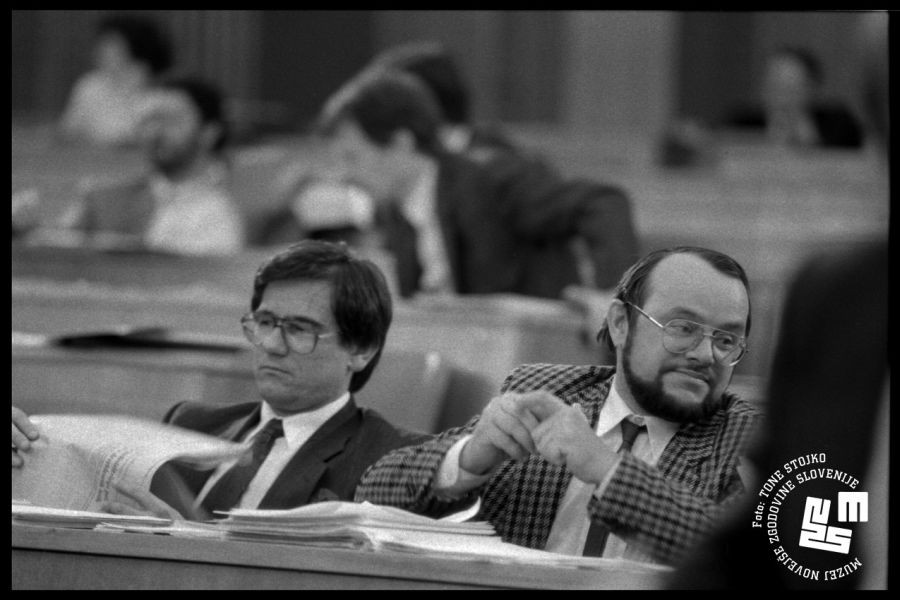27. 2. 1991: The persistently looming red star
On the way to a key act
On 27 February, the world was mainly concerned with the situation in the Iraqi Gulf. Iraqis had already withdrawn from occupied Kuwait and indicated their willingness to accept United Nations resolutions in exchange for a ceasefire, according to Iraqi Foreign Minister Tariq Aziz. In fact, there were reports coming from the field that the weapons had mostly gone silent. The U.S.-led Allied coalition was on the verge of victory after less than a month and a half of waging war.
In Slovenia, the focus was on the Minister of Justice, Dr Rajko Pirnat, who presented the denationalisation act. This was one of the key pieces of legislation in the process of Slovenia's farewell to the post-war communist system. In his presentation, Minister Pirnat therefore emphasised that the main motive for the act was to remedy the injustices caused by post-war expropriations. He mentioned the restitution of property in kind as a key principle of the act, although it was clear from the very beginning that it would not be possible to restitute everything in kind. In such cases, denationalisation beneficiaries are supposed to receive compensation in the form of bonds of the Republic of Slovenia. The Minister of Justice also touched on the heated debate about what the priority should be when establishing a new social system – denationalisation or privatisation. He said that the two processes were not contrary to each other, as denationalisation is supposed to be the fastest form of privatisation.
The red star continues to loom large
From a rather cautious comment by Delo journalist Silva Čeh entitled "Fear of Owners?" it was understood that in February 1991 the majority of the public clearly understood the rectification of past injustices as unavoidable on the path to a democratic future; however, some other responses clearly showed how difficult it was to say goodbye to the past, especially with respect to issues important on a symbolic level.
On that same day when Pirnat spoke about the new law, a meeting took place between the delegations from the opposition Democratic Reform Party, the former League of Communists, led by Ciril Ribičič, and the Federation of Associations of Combatants of Slovenian National Liberation Army, led by General Ivan Dolničar. They concluded that the two organisations had similar views on a number of issues. They were satisfied that the National Assembly did not change the Slovenian flag by a fast-track procedure and that the red star remained on it. Dolničar believed that Slovenians should have the last word on state symbols in a referendum. Ribičič found it "shameful" that the chairman of the parliamentary Legislative and Legal Commission, Anton Tomažič, from the ranks of the Slovenian Democratic Union, suggested that Slovenians use a tricolour without a star. Along with the denationalisation act, the president of Post-Communists developed a mantra that dominated the public discourse throughout most of the 1990s, saying they opposed the restitution of former feudal property (which included church property) and the restitution of property to foreigners and collaborators.
At the same time, the announced denationalisation irritated Bogdan Osolnik, a representative of the Federation of Associations of Combatants of Slovenian National Liberation Army, a long-time Yugoslav official and co-founder of the College of Political Science, the present-day Faculty of Social Sciences. He was concerned that it would give the impression that post-war injustices were "the only injustices that have happened", while the injustices during the war were being forgotten. Osolnik was also vehemently opposed to the possibility of restitution of property for "collaborators and war profiteers". His statements were permeated by the spirit of public debates in later years to the present, although even the tone of the Federation of Associations of Combatants of Slovenian National Liberation Army in the days of the breakup of Yugoslavia was more moderate than later. According to Delo, Osolnik agreed at least to review "some trials in question if there are suspicions that they were not fair".
Gorbachev going back to the old ways
Let’s return to the international scene. On 27 February 1991, the President of the Soviet Union Mikhail Gorbachev visited Minsk in Belarus and spoke at the Academy of Sciences there. At that time, he was already under strong pressure from the democratic opposition, which was most embodied by the then chair of the Russian Supreme Soviet and later Russian President Boris Yeltsin and the Mayor of Moscow Gavril Popov. Less than three weeks before the referendum on the future of the Soviet federation, the father of perestroika was more and more returning to the good old Soviet rhetoric. In Minsk, he pointed out that his opponents wanted to "leave socialism behind and advocate capitalisation of society". Gavril Popov is said to have carried out a "campaign against the people and the federation", while far-reaching ideas of the opposition were in many cases born "in foreign scientific centres". These may have been the first signs that the authorities in Minsk would defend their control of society with a similar vocabulary thirty years later.
Author: Aleš Maver
Similar articles
-
Triumphant Year of 1991
-
9. 5. 1991: Facilitated processing of independence laws
-
2. 3. 1991: Slovenians abroad and around the world in concern for Slovenia
-
1. 3. 1991: Franco Juri against the transfer of conscripts to the Slovenian Territorial Defence
-
28. 2. 1991: Prepared defence and protection act proposal to ensure a plebiscite decision
-
27. 2. 1991: The persistently looming red star
-
26. 2. 1991: A hopeless search for the Yugoslav modus vivendi
-
16. 2. 1991: Ciril Ribičič on the red star and reservations about the dissolution of Yugoslavia
-
15. 2. 1991: Two thirds of respondents have faith in an independent Slovenia
-
27. 1. 1991: Between a relaxation of tensions at home and a deteriorating situation in the Middle East



